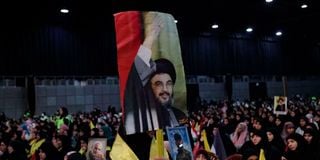Iran twin blasts kill 103 near grave of Guards general Soleimani

A supporter holds a portrait of Lebanon's Hezbollah chief Hasan Nasrallah during the commemorations of the anniversary of the killing of slain top Iranian commander Qasem Soleimani on January 3, 2024. Twin bomb blasts killed at least 103 people in Iran
Tehran, Iran
Twin bomb blasts killed at least 103 people in Iran on Wednesday, ripping through a crowd commemorating Revolutionary Guards general Qasem Soleimani four years after his death in a US strike, state media reported.
The two explosions -- unclaimed but labelled a "terrorist attack" by state media and regional authorities -- came amid high Middle East tensions over the Israel-Hamas war in Gaza and the killing of a Hamas senior leader in Lebanon on Tuesday.
The blasts, about 15 minutes apart, struck near the Martyrs Cemetery at the Saheb al-Zaman Mosque in Kerman, Soleimani's southern hometown, as supporters gathered to mark his killing in a 2020 US drone strike in Baghdad.
"The number of people killed rose to 103 following the deaths of people injured during the terrorist explosions," said the official IRNA news agency, while state television reported 211 wounded, some in critical condition.
Among those killed were three paramedics who rushed to the scene after the first explosion, said Iran's Red Crescent.
IRNA said the first explosion took place around 700 metres (yards) from Soleimani's grave while the other was around one kilometre away.
President Ebrahim Raisi condemned the "heinous" crime as the Islamic Republic of Iran declared Thursday a national day of mourning.
Tasnim news agency, quoting what it called informed sources, said "two bags carrying bombs went off" and "the perpetrators... apparently detonated the bombs by remote control".
Online footage showed panicked crowds scrambling to flee as security personnel cordoned off the area.
State television showed bloodied victims lying on the ground and ambulances and rescue personnel racing to help them.
"We were walking towards the cemetery when a car suddenly stopped behind us and a waste bin containing a bomb exploded," an eyewitness was quoted saying by the ISNA news agency.
"We only heard the explosion and saw people falling."
By nightfall, crowds returned back the Martyrs Cemetery in Kerman chanting: "Death to Israel" and "Death to America".
In Tehran, thousands gathered at the Grand Mosalla Mosque to pay tribute to Soleimani.
"We condemn today's bitter terrorist incident... I hope the perpetrators of the crime will be identified and punished for their actions," Soleimani's daughter, Zeinab, said.
Soleimani headed the Quds Force, the foreign operations arm of the Islamic Revolutionary Guards Corps, overseeing military operations across the Middle East.
Russian President Vladimir Putin expressed his condolences over Wednesday's twin blasts.
"The killing of peaceful people visiting the cemetery is shocking in its cruelty and cynicism," Putin wrote to Raisi and supreme leader Ayatollah Ali Khamenei.
Iraq -- where some 3,000 people gathered in Baghdad Tuesday to commemorate Soleimani -- condemned the attack in Iran and offered any help needed "to alleviate the impact of this cowardly criminal act".
The blasts came a day after Hamas number two Saleh al-Aruri -- an Iran ally -- was killed in a strike, which Lebanese officials blamed on Israel, on a southern Beirut suburb that is a stronghold of Iran-backed armed group Hezbollah.
There was no immediate claim of responsibility for the Iran bombings, the country's deadliest since the 1979 Islamic revolution.
Iran has long fought a shadow war of killings and sabotage with arch enemy Israel and also battled various jihadist and other militant groups.
In September, the Fars news agency reported that a key "operative" affiliated with the Islamic State group, in charge of carrying out "terrorist operations" in Iran, had been arrested in Kerman.
In July, Iran's intelligence ministry said it had disbanded a network which it said was "linked to Israel's spy organisation" and which had been plotting "terrorist operations" across Iran including in Kerman, according to IRNA.
It said the alleged plots included "planning an explosion at the grave" of Soleimani as well targeting other public gatherings.
Iran has suffered previous attacks and bombings that claimed scores of lives, some claimed by groups that Tehran has classified as "terrorist" organisations.
In 2019, a suicide car bombing of a Guards bus killed 27 troops in southeastern Iran. It was later claimed by Jaish al-Adl, a jihadist group formed in 2012.
Soleimani, whom Khamenei years ago declared a "living martyr", was widely regarded as a hero in Iran for his role in defeating IS in both Iraq and Syria.
Long seen as a deadly adversary by the United States and its allies, Soleimani was one of the most important powerbrokers across the region, setting Iran's political and military agenda in Syria, Iraq and Yemen.





